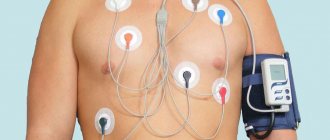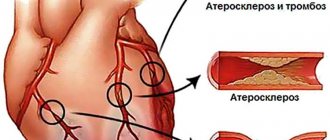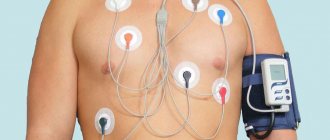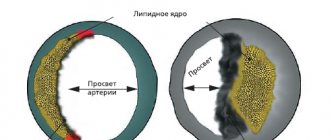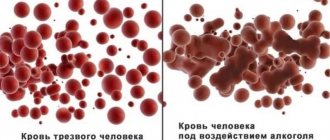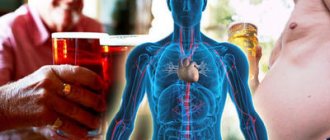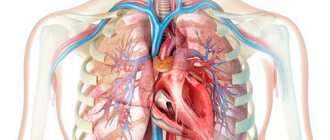Harm of alcohol to the cardiovascular system
Ethanol is a poison that affects almost all organs of a person who drinks alcohol. The heart is one of the first to suffer. Long-term alcohol abuse entails specific changes in the heart muscle. This phenomenon is called alcoholic cardiomyopathy.
When drinking alcohol, the following happens:
- blood pressure increases;
- pulse increases by about 25%;
- the load on the myocardium increases.
Blood transports oxygen and nutrients to tissues and organs more slowly. Tachycardia is typical even for healthy people. As a result, this leads to malfunctions of the myocardium. If the norm is followed, there will be no particular harm. However, if you exceed the recommended doses of alcohol, the load on the heart increases. This is especially true when combining the use of ethanol-containing drinks with smoking.
How does alcohol affect the heart?
If the functions of the heart muscle are insufficient, the patient notes:
Deterioration of myocardial contractility.- Decrease in minute volume of blood - the amount that flows through the cavities of the atria and ventricles.
- Constant or periodic tachycardia (frequent contraction rhythm);
- Increasing shortness of breath. Primary attacks occur during severe psychophysical stress, but very soon appear at rest.
- Swelling of the legs after prolonged walking or standing. In advanced cases, pastiness persists even in the lying position.
If the cause of AK lies in thiamine deficiency, then the clinical coloring of the disease changes.
The patient is determined:
- increase in minute blood volume values against the background of tachycardia;
- systolic murmur when a doctor auscultates (listens to) heart rhythms using a phonendoscope;
- severe swelling of the arms and legs with shortness of breath, audible from a distance.
In this case, immediate administration of thiamine is necessary, which can significantly alleviate the person’s condition.
Causes of pain
Alcohol negatively affects the functioning of the entire cardiovascular system. An imbalance in the functioning of the muscles of the organ leads to chest pain. Muscle fibers are inhibited due to exposure to alcohol, and blood vessels react inadequately. The load on the entire cardiovascular system increases, toxic damage and metabolic disorders occur.
Those who abuse ethanol-containing drinks often complain of chest pain. Such symptoms are caused by spasms of the coronary vessels. The pain can be nagging or aching, of varying degrees of intensity. Sometimes even nitroglycerin does not help reduce the severity of unpleasant sensations.
A characteristic feature of this condition is that the heart may hurt even the next day after drinking alcohol. This also sometimes happens at night. There is heaviness in the chest, difficulty breathing, pinching or aching sensations. Sedatives will help you calm down and relieve pain: motherwort, valocordin or validol.
If, after drinking strong alcohol, your heart begins to pound strongly due to a hangover, you should immediately consult a doctor. This may indicate the initial stage of atherosclerosis and other serious diseases.
Sometimes heart pain can be triggered by other organs. Ethanol has a detrimental effect on the digestive system. Malfunctions of these organs cause unpleasant sensations radiating to the thoracic region.
Diagnosis of the effects of alcohol on the human heart
When identifying alcoholic cardiopathy, the following comes to the fore:
Interview and examination of the patient. This takes into account the length of abuse and the presence of characteristic complaints.- Study of auscultation and percussion patterns (listening and tapping the chest area with fingers). Muffled tones and specific noises indicate the presence of a disease.
- Ultrasound and Rg diagnostics, ECG. When examining photographs taken during a binge, the doctor reveals a pronounced myopathic configuration of the heart. During a sober period, this symptom goes away. In medicine, this phenomenon is called “sliding harmonica.”
Histological analysis shows that patients who died from this complication have pronounced fatty impregnation of the myocardium, swelling of the heart cells and a large amount of glycogen in them.
A characteristic feature of AK is its reverse development with long-term adherence to a sobriety regime.
Contraindications for use in heart disease
Ethanol contributes to the accelerated development of cardiovascular diseases. If you have any of these pathologies, you should be careful about drinking alcohol or stop drinking it altogether:
- arrhythmia - this especially applies to atrial fibrillation in paroxysmal form;
- tachycardia - ethanol has a detrimental effect on the body and causes critical harm, an attack may occur;
- angina pectoris - you need to limit alcohol consumption to 40 ml, choose only a high-quality product;
- heart disease - you can drink only a small amount of dry red wine or cognac, and be responsible for observing the dosage, which is 150 and 40 ml, respectively.
It is recommended to abstain from alcoholic beverages if you have heart failure. If you have recently undergone heart surgery, you should exclude alcohol from your diet for the entire adaptation period.
INTER-HEART Study
The INTER-HEART study involved 27 thousand patients from more than 50 countries. It took about 16 years. All this time, scientists have been monitoring the health of men and women from different age groups, with different habits and quality of life. As a result, a number of interesting data became available to scientists.
Among men aged 55-60 years who did not smoke, adhered to a healthy diet, spent at least half an hour a day in various sports and were not overweight, drinking 1-2 drinks of alcohol per day reduced the risk of developing myocardial infarction by almost 50% .
Similar, although less impressive, results were found in a group of men with hypertension. One dose of alcohol per day reduced the risk of heart attack by almost a third, but increasing this amount to 2-3 doses per day or more led to destabilization of the course of the disease and an increase in blood pressure. Moreover, it is alcohol in large doses that is one of the common causes of arterial hypertension, and also directly and indirectly affects the heart, causing a decrease in its contractility, the development of left ventricular hypertrophy and increasing the risk of heart failure.
Restoring the cardiovascular system after alcoholism
Restoring normal functioning of the cardiovascular system after quitting alcohol is not so quick or easy. It is possible to bring the myocardium to its original state only if a number of rules are followed. One of the main ones is a diet in which the content of fat and salt in the diet is minimized. You will need to eat more fresh fruits and vegetables. Light physical activity in the fresh air won't hurt either. Adequate sleep also helps restore the body and heart after stopping drinking alcoholic beverages.
If these measures do not have an effect, the doctor selects treatment. The standard regimen would be to take diuretics to remove excess fluid. The list of medications for therapy should be agreed upon with a cardiologist. This is the only way to improve your health. It is not possible to completely restore the cardiovascular system after alcoholism. However, stopping the destructive processes is quite possible.
What does alcohol do to the blood vessels and body of pregnant women and the fetus?
Alcohol in any quantity or form is contraindicated for pregnant women. It negatively affects the fetal organs that are not yet fully formed and strengthened, and its mental development. The embryo may experience oxygen starvation of the brain. Women who drink have children born with:
- irregular skull shape;
- spherical eyes;
- underdevelopment of the jaws;
- sexual dysfunction.
And this is not to mention what alcohol does to the heart and blood vessels of the woman herself. Pregnancy is a stress on the body. Pregnant women may experience tachycardia, develop varicose veins, and decrease immunity. It is important that a woman becomes aware of the harmfulness of alcohol and the colossal harm to her offspring.
Promises of fans of the theory
Fans and followers of the theory of daily ethanol intake in small quantities claim that the beneficial effect can be noticed a week after the start of its use. The benefits will be:
- in reducing headaches,
- normalization of appetite,
- reducing weakness and feelings of fatigue,
- easy awakening in the morning,
- The body will gain strength and it will be easier to bear the load.
This effect is desirable for many people. And they will not be embarrassed by the daily morning intake of strong alcohol. The key is to maintain the dosage and use the same type of drink. But is everything so simple and good? Let's take a look at the opinions of opponents of the theory of treating the body with alcoholic drugs.
What dose of alcohol is considered safe?
According to the recommendations of the World Health Organization, men can drink up to 10 liters of pure alcohol per year. This dose is considered safe for health. Russian narcologists adhere to more strict limits: up to 8 liters per year with mandatory abstinence from alcohol 3-4 days a week. At the same time, women are allowed to drink one third less alcoholic beverages. This can be explained by the fact that for the weaker sex, alcohol consumption is associated with great risks. There is less water in the female body, so the concentration of alcohol in it, and therefore toxic substances, will be greater. In addition, the body of the fairer sex produces fewer enzymes involved in the breakdown of alcohol, so it is excreted more slowly.
What alcohol dilates blood vessels
All alcohol-containing products have an initial expanding effect, and then a contracting effect. The duration of these periods is influenced by the type and strength of the drink consumed, alcohol experience, age and gender of the person, and the presence of concomitant ailments.
To maintain the expansion effect for a longer time, it is customary to drink 50 ml of cognac, 150 ml of wine or 200 ml of beer. When drinking pure vodka, the bloodstream narrows much faster than from using other intoxicating drinks.
This happens for the following reasons:
- Tannins, catechins and anthocyanins, which are found in sufficient quantities in cognac and natural wines, contribute to the expansion effect.
- The high concentration of potassium salts in beer acts as a source of ions, increasing the period of relaxation of the walls.
- One of the components of alcohol-containing liqueurs, tinctures and sweet wines is sugar and a small percentage of magnesium salts. These compounds help weaken the tone of the arteries and veins and increase blood flow.
But you shouldn’t be deluded by these facts and lean heavily on cognacs and liqueurs. Exceeding the permissible amount of drinking and constant alcoholization of the body very quickly lead to vasoconstriction. Moreover, the longer they were relaxed under the influence of the tannins of noble drinks, the longer they will be spasmed under the toxic influence of decomposition products.
Alcoholic heart (alcoholic cardiomyopathy, bovine heart syndrome)
The term “alcoholic heart” (bovine heart syndrome) is widely known in the medical literature. Alcoholic heart syndrome or cardiomyopathy may well occur with a short history of alcoholism and with relatively small doses of alcohol consumption.
There are several reasons for the development of alcoholic heart syndrome (alcoholic cardiomyopathy, bovine heart syndrome):
Firstly, this is the harmful toxic effect of alcohol and its breakdown products on the myocardium.
Secondly, it is a factor in the disruption of the activity of the heart muscle due to insufficient formation of proteins. Violation of protein synthesis, in turn, occurs as a result of alcoholic liver damage. In people who abuse alcohol, the absorption of B vitamins is significantly reduced; vitamins of this group are extremely important for the normal functioning of the heart.
Doctors' opinions on alcohol
If previously the belief about the benefits of a glass of wine and a glass of vodka was popular among doctors, now everyone is actively disowning these beliefs. Recent scientific studies have proven 100% negative effects of alcohol on the body. Today, the safest and healthiest solution is to give up alcoholic beverages or reduce them in your diet to a minimum.
There is not a single medical recommendation on alcohol consumption in the world. No disease can be cured or prevented by this dangerous substance. The heart and blood vessels should be treated with medications and physical activity, and flu and coronavirus should be prevented by vaccination.
Alcoholism is a serious disease that destroys a person both physically and socially. It always starts with “safe” doses—a glass of wine on Friday night, a can of beer after work—and ends with dire consequences. Control yourself and try to limit your drinking to holidays and special events.
Take care of your health!
Where did humans get the ability to metabolize alcohol?
The body of all mammals contains the enzyme alcohol dehydrogenase, which is responsible for the breakdown of alcohol. However, despite the fact that it processes alcohols well, this enzyme has difficulty coping with ethanol. If a person had inherited the same characteristics of the body from animals, then he would not be drawn to alcohol: even small doses contained in ripe fruits would lead to severe intoxication, not to mention stronger drinks.
Scientists were able to discover that in the process of evolution, our ancestors acquired a special subtype of this enzyme - ADH4 (alcohol dehydrogenase of the fourth class). A small genome mutation led to a change in the 294th amino acid of the enzyme and allowed the body of our ancestors to digest ripe fruits and not climb trees for unripe fruits.
So, 10 million years ago, the human body’s ability to metabolize ethyl alcohol helped people begin to explore open spaces instead of climbing trees, and then become homo erectus.
